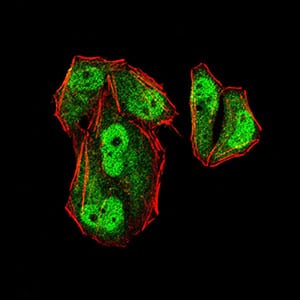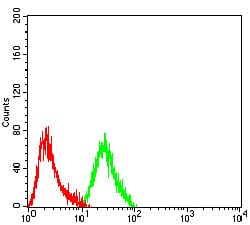


| WB | 咨询技术 | Human,Mouse,Rat |
| IF | 咨询技术 | Human,Mouse,Rat |
| IHC | 咨询技术 | Human,Mouse,Rat |
| ICC | 1/200 - 1/1000 | Human,Mouse,Rat |
| FCM | 1/200 - 1/400 | Human,Mouse,Rat |
| Elisa | 1/10000 | Human,Mouse,Rat |
| Aliases | FCC2; COCA2; HNPCC; hMLH1; HNPCC2 |
| Entrez GeneID | 4292 |
| clone | 8C12B7 |
| WB Predicted band size | 84.6kDa |
| Host/Isotype | Mouse IgG2b |
| Antibody Type | Primary antibody |
| Storage | Store at 4°C short term. Aliquot and store at -20°C long term. Avoid freeze/thaw cycles. |
| Species Reactivity | Human |
| Immunogen | Purified recombinant fragment of human MLH1 (AA: 381-483) expressed in E. Coli. |
| Formulation | Purified antibody in PBS with 0.05% sodium azide |
+ +
以下是3篇关于MLH1抗体的参考文献概览:
1. **文献名称**: "MLH1 Immunostaining in Colorectal Cancer"
**作者**: Lindor NM, et al.
**摘要**: 该研究验证了MLH1抗体在结直肠癌组织中的免疫组化应用,发现MLH1蛋白表达缺失与微卫星不稳定性(MSI)高度相关,可用于林奇综合征的快速筛查及患者分层管理。
2. **文献名称**: "MLH1 Promoter Methylation and Antibody-Based Detection"
**作者**: Shia J, et al.
**摘要**: 通过对比MLH1抗体染色与DNA甲基化分析,证明MLH1表达缺失主要由启动子区超甲基化引起,为散发性结直肠癌与遗传性癌症的鉴别提供了重要实验依据。
3. **文献名称**: "Validation of MLH1 Antibody for Diagnostic Use"
**作者**: Overbeek LI, et al.
**摘要**: 多中心研究评估了不同实验室使用MLH1抗体的标准化流程,证实其在子宫内膜癌和结直肠癌中检测错配修复缺陷的可靠性,并提出优化染色判读标准以提高诊断一致性。
注:以上文献为领域内代表性研究,实际引用时建议通过PubMed/Google Scholar核对最新版本及具体期刊信息。
The MLH1 antibody is a crucial tool in molecular pathology, primarily used to detect the MLH1 protein, a key component of the DNA mismatch repair (MMR) system. MLH1. encoded by the *MLH1* gene on chromosome 3p22.2. forms heterodimers with other MMR proteins (e.g., PMS2) to correct DNA replication errors. Loss of MLH1 function, often due to mutations or epigenetic silencing, disrupts MMR, leading to microsatellite instability (MSI) and increased cancer risk. Germline *MLH1* mutations are linked to Lynch syndrome, a hereditary condition predisposing to colorectal, endometrial, and other cancers. In sporadic cancers, MLH1 deficiency is commonly caused by promoter hypermethylation.
Clinically, MLH1 immunohistochemistry (IHC) helps identify tumors with MMR deficiency. Absence of nuclear MLH1 staining guides further testing (e.g., *BRAF* mutation or methylation analysis) to differentiate Lynch-associated cancers from sporadic cases. It also aids in stratifying patients for immunotherapy, as MSI-high tumors often respond better to immune checkpoint inhibitors. Researchers additionally use MLH1 antibodies in Western blotting or immunofluorescence to study DNA repair mechanisms. Interpretation requires caution, as MLH1 loss may coexist with PMS2 loss due to their functional partnership. Overall, MLH1 antibody-based assays are vital in diagnostics, prognostics, and personalized oncology.
×